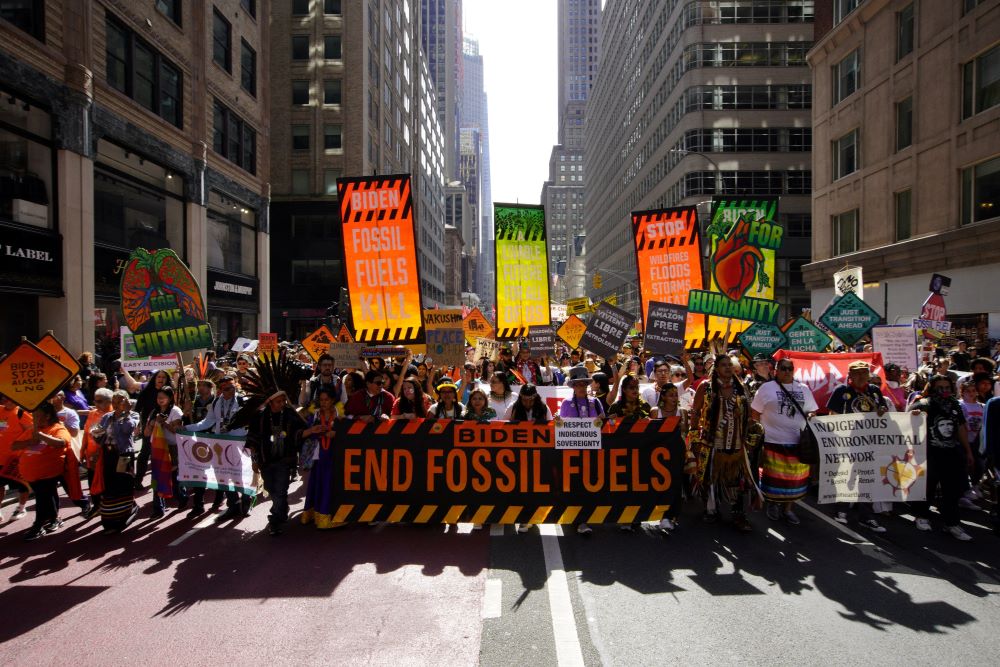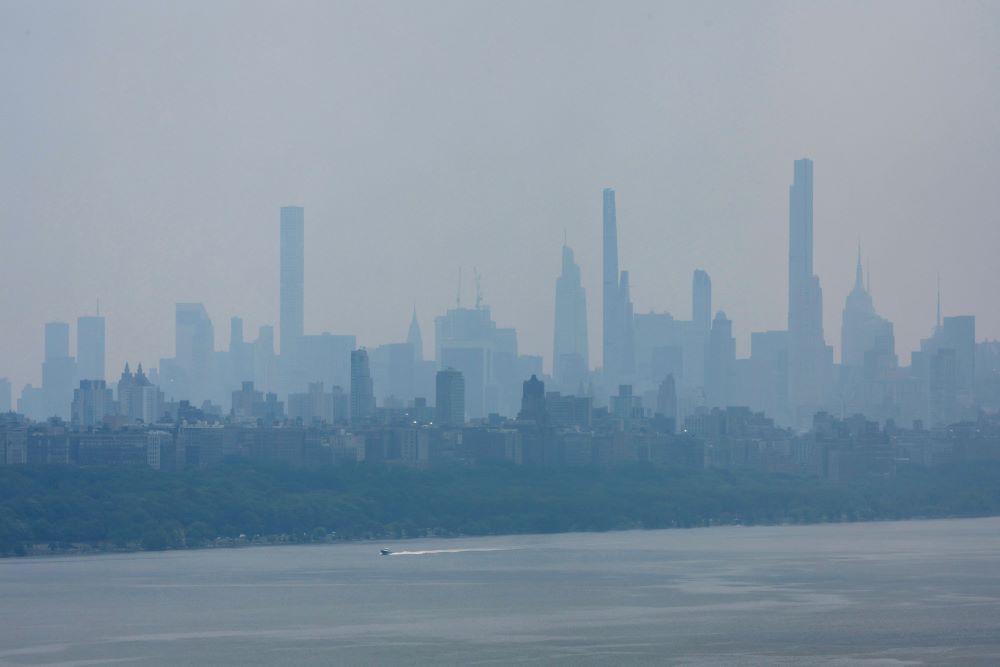
Activists mark the start of Climate Week in New York City Sept. 17, during a demonstration calling for the U.S. government to take action toward ending fossil fuel use in order to reduce the impact of global climate change. (OSV News/Reuters/Eduardo Munoz)
The week before Pope Francis released a new climate teaching, U.S. Catholics reported being more likely than other U.S. adults to be optimistic that we can address climate change and more likely to be motivated to address the crisis. But they were also significantly more suspicious of groups pushing for action on climate change.
A new Pew Research Center poll conducted Sept. 25-Oct. 1 surveyed 8,842 U.S. adults on their attitudes about climate change. Francis' climate letter, Laudate Deum, and the new polling come after a summer of climate disasters, including flooding, wildfires and unprecedented heat.
Compared to 38% of U.S. adults who said that recent news on climate change made them feel optimistic that we can address the issue, 46% of U.S. Catholics expressed similar optimism. And while 50% of U.S. adults said climate change news made them feel motivated to do more to tackle the issue, 55% of U.S. Catholics said they were motivated to do more.
But Catholics also expressed higher levels of suspicion toward the people and groups taking action on climate change, with 61% saying climate change news made them feel suspicious toward those people, compared to only 53% of U.S. adults overall.
A 2022 Pew survey revealed significant differences in how Catholics approach climate change based on party, race and ethnicity and age, illustrating one reason Catholics do not have a unified response to climate change questions.
That survey found Democrat or Democratic Party-leaning Catholics, Hispanic Catholics and young Catholics to be more concerned about climate change than Republican or Republican-leaning Catholics, white Catholics and older Catholics.
Recent polling by the Public Religion Research Institute echoed these findings on race and ethnicity. While 31% of Hispanic Catholics said that climate change is a crisis, only 20% of white Catholics said the same.
The new Pew study did not break down the group of Catholic respondents by further demographics.
Pope Francis poses for a photo with John Kerry, U.S. President Joe Biden's special envoy for climate issues, during a meeting at the Vatican June 19. (CNS/Vatican Media)
On Oct. 4, Francis reiterated his call to action on climate change in Laudate Deum, where he promoted climate science, criticized the idea of technology and economic growth as unquestioned goods and urged significant action at the upcoming United Nations climate change conference COP28.
The Pew survey revealed a declining trust in climate scientists. Thirty-two percent of U.S. adults said that climate scientists understand "very well" whether climate change is happening, with 24% saying they understand "very well" the causes of climate change and 13% saying they understand "very well" the best ways to address climate change.
The percentage of U.S. adults saying that climate scientists understand whether climate change is happening either "very well" or "fairly well" fell from 72% in 2016 to 68% in 2023. Similarly, while 68% of U.S. adults said in 2016 that climate scientists understood "very well" or "fairly well" the causes of climate change, only 63% said the same in 2023.
In an even more dramatic drop, the percentage of U.S. adults saying that climate scientists understand the best ways to address climate change either "very well" or "fairly well" fell from 64% in 2016 to 52% in 2023.

Haze and smoke caused by wildfires in Canada linger over the skyline of midtown Manhattan in New York City as seen from Fort Lee, N.J., June 8. Wildfires have always occurred, but experts say the warming climate is increasing their severity. (OSV News/Reuters/Mike Segar)
The U.N. Intergovernmental Panel on Climate Change's 2023 synthesis report, considered to be an authoritative and comprehensive summary of widely agreed upon climate science, says, "human activities, principally through emissions of greenhouse gases, have unequivocally caused global warming." The report contains a detailed analysis of various climate solutions.
While Catholics were roughly in line with overall U.S. adults in their judgment of climate scientists' knowledge, they expressed less support for climate scientists' influence in public policy debates. Forty-five percent of U.S. Catholics said that climate scientists had "too little" influence compared to 50% of U.S. adults. Compared to 26% of U.S. adults who said climate scientists had "too much" influence, 29% of U.S. Catholics said the same.
The Pew survey showed a growing belief that technology will not be able to address most problems climate change caused. Pew asked U.S. adults who believe that climate change is a problem whether 30 years from now it was more likely that technology could address most of the problems caused by climate change or whether major changes to everyday life will be needed.
Only 30% of those adults said that technology could address the problems, a decrease from the 46% of U.S. adults in 2021 who said the same of technology's ability to address climate problems 50 years from now. Catholics answered this question similarly to U.S. adults overall.
Advertisement
While Francis emphasizes the impact of activism in Laudate Deum, U.S. Catholics participated in climate activism at similar rates as U.S. adults overall, a percentage that is slightly down from 2021.
"The demands that rise up from below throughout the world, where activists from very different countries help and support one another, can end up pressuring the sources of power," Francis writes, later underscoring that, while "the most effective" solutions come from major political decisions, individual lifestyle changes can contribute to important cultural changes.
In the past year, 22% of U.S. Catholics either attended a climate protest, volunteered for an activity addressing climate change, donated to an organization focused on climate change or contacted an elected official to ask for action on climate change, compared to 21% of U.S. adults overall. Twenty-four percent of U.S. adults said they did one of these types of activism in 2021.
U.S. Catholics said that climate activism is effective in influencing elected officials and that individual Americans can help "a lot" to reduce the effects of climate change at higher rates than U.S. adults overall.
Thirty-two percent of U.S. Catholics said that individual Americans can help "a lot" to reduce the effects of climate change, compared to 27% of U.S. adults overall. And 15% of U.S. Catholics said that climate activism was either "extremely effective" or "very effective" in getting elected officials to act on climate change compared to 11% of all U.S. adults.








